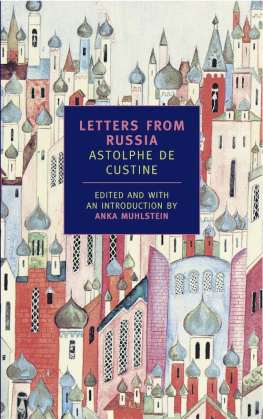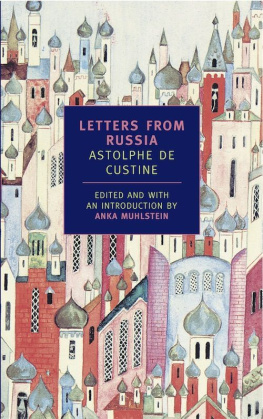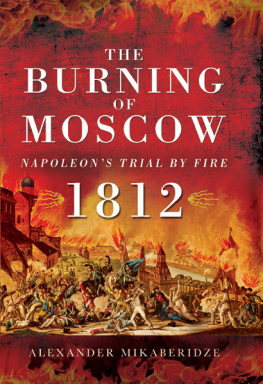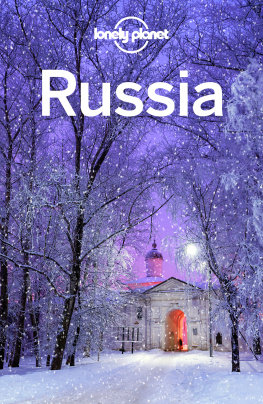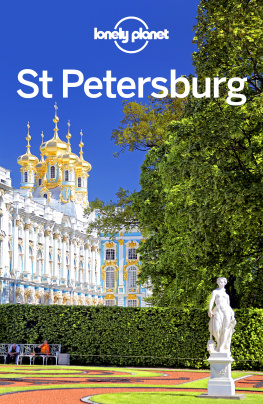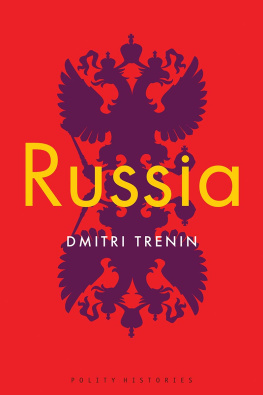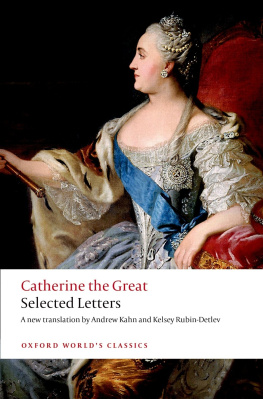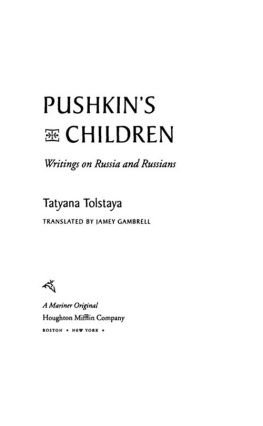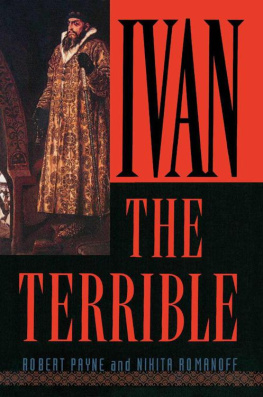ASTOLPHE DE CUSTINE (17901857) was born at the onset of the French Revolution and died under the Second Empire. His father was guillotined and he and his mother barely survived the Terror. A poet and novelist of slight repute, Custine gained recognition with the publication of the travel books Spain under Ferdinand VII and Letters from Russia, an enduring analysis of the roots and character of Russian despotism.
ANKA MUHLSTEIN was born in Paris in 1935. She settled in New York in 1974 where she began her career as a writer in French. She was awarded the Goncourt Prize in 1996 for her biography of Custine, and has twice received the History Prize of the French Academy.
LETTERS FROM RUSSIA
ASTOLPHE DE CUSTINE
The 1843 translation
Edited, revised, and with an introduction by
ANKA MUHLSTEIN
NEW YORK REVIEW BOOKS

New York
CONTENTS
INTRODUCTION
ASTOLPHE DE CUSTINE arrived in St. Petersburg on July 10, 1839. He reached Moscow on the third of August. Ten days later, he headed northeast for about 150 miles. He stopped at Yaroslavl, then spent a few days in Nizhny Novgorod, and returned to Moscow and St. Petersburg. On October 1, he was back in Berlin. His entire stay in Russia lasted less than three months. Custine did not speak a word of Russian, and traveled under the protection and surveillance of a government official. Yet he produced a most explosive and unexpected account of his journey, Russia in 1839 or, as it is also known, Letters from Russia, one of those rare books that refuse to die.
Banned in Russia, Custines work was an immediate success in Europe when it appeared in 1843, and was read widely during the ten years that followed. It was rediscovered in Russia in 1910, when an abridged version was published, only to be suppressed a second time under Lenin: any reader could perceive the parallels between the Russia of Nicholas I and the Communist State. Then, in 1951, at a time when the cold war turned into bloody combat on the Korean Peninsula, another English version (again abridged) appeared with a preface by Walter Bedell Smith, who had been the United States ambassador to the Soviet Union in the late 1940s. More substantial editions were published in the United States in 1989 and in France in 1990.
In the nineteenth century, the Russian philosopher Alexander Herzen declared Custines book the most intelligent work ever written on Russia; in the twentieth, George Kennan, himself a former charg daffaires to the Soviet Union, wrote that it was no doubt the best description available of the world that had given rise to Stalin. Because of its historical significance and its ongoing contemporary relevance, Letters from Russia has continued to be widely read and studied, and the character and the motivations of the author of this extraordinary work have also become topics of particular interest. Why, one wants to know, did Custine choose to travel to that distant and forbidding country, and why did he, an aristocrat and a dandy, a man of conservative opinions, a flattered guest of the Czar, immediately grasp the timeless cruelty of Russias despotic regime?
As a writer, Custines gifts included a keen eye, an avid curiosity, and a fiercely independent intellectcharacteristics that explain both the motives and the success of his endeavor. Why go to Russia? The simple answer may be that Custine had a passion for travel. He discovered Italy, Germany, and Switzerland at a young age, and kept going back to those quintessential parts of Europe. He had also visited England and Scotland, and knew Spain quite well. The next step for a Romantic writer would normally have been either Jerusalem and the Middle East or America, which, thanks to Chateaubriand, had marked the new French sensibility. Russia was certainly a surprising choice but not an irrational one.
For years, Custine had published poems, novels, and plays without much success. However, in 1838 his account of a journey in Spain was well received by both the press and the public. Balzac, a much-admired friend, encouraged him to continue in that vein and suggested to him Russia or, as it was called at the time, the North:
There are very few modern books that can be compared to [yours].... If you do the same for every country, you will have a unique collection in the genre and a collection that will be of the greatest value, believe me.... I will do everything in my power to persuade you to also describe... the North.
But Custine hardly needed to be spurred on. Russia had in fact been on his mind ever since Tocqueville, in 1835, had published his Democracy in America to enormous acclaim. Tocqueville made a point of contrasting Russia and the United States:
There are on earth today two great peoples who, having started from different points, seem to be advancing towards the same end: they are the Russians and the Anglo-Americans. They both grew up in darkness; and whilst Europeans were busy elsewhere, they suddenly placed themselves in the forefront of nations, and the world learned at almost the same time of their births and their greatness.
All other nations seem, more or less, to have reached the limits nature has assigned to them and within which they now need only to remain, but those two are still growing.... America is struggling against obstacles of nature; Russia against men.... The principal means of action for the one is liberty; for the other servitude.
Tocqueville believed reluctantly in the inevitable victory of the American model; Custine, more skeptical in every way, may well have hoped to discredit such a view through symmetrical comparison. The two men, in any case, had much in common. Their families had both been hounded and ruined by the French Revolution, and they themselves were both conservatives, troubled by the loss of their place in society but convinced of the impossibility of going back to pre-revolutionary principles. When Tocqueville points out that he has an intellectual taste for democratic institutions, but that, as an instinctive aristocrat, he despises and fears the crowd, he anticipates Custines question whether one ought not to impose a silence on [ones] antipathies and accept with good grace a wise and moderate representative government. Tocqueville went to the United States to study the effects of democracy in the American republic, and Custine hoped to find in Russia new arguments against the despot that reigns at home, against disorder baptized with the name of liberty.
Why then did he return to France with his mind entirely changed? The fact that Custine begins his book by retracing the story of his family during the Terror gives us a clue. He had been born to privilege in an aristocratic family of considerable wealth, but at the wrong time, in 1790 at the onset of the French Revolution. His paternal grandfather, who had fought on the side of the Colonies in the war of American Independence and embraced the new ideals to the point of commanding one of the French revolutionary armies, was for all that imprisoned, tried, and executed in 1792. A few weeks later, his son, Astolphes father, was also executed. Custines mother was arrested. The boy, entrusted to the care of a devoted servant, saw her brought back home by armed men, who pushed her around while searching for incriminating papers. They ransacked the apartment, sealing off every room except the kitchen where Astolphe and his nanny had taken refuge. For a child these must have seemed incomprehensible acts, even though the brutal scenes he had already witnessed in the streets of Paris might have prepared him for more violence.

